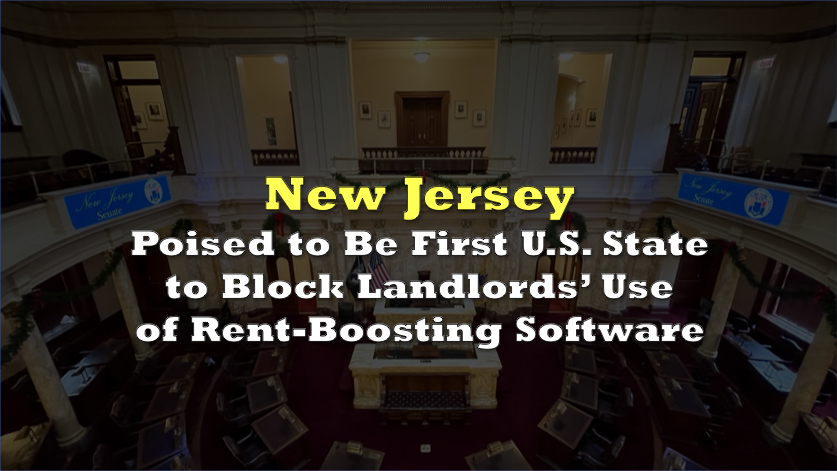In a first-of-its-kind legislative move, New Jersey could soon become the pioneering U.S. state to ban landlords from using algorithmic software to set rental prices—a practice that advocates argue has exacerbated the state’s already sky-high housing costs.
After contentious debate and passionate testimony, a bill that would prohibit landlords from employing these pricing algorithms was advanced by the New Jersey Assembly’s housing committee in a 4-2 party-line vote on Thursday, October 24.
The bill, led by Assemblywoman Yvonne Lopez, comes amid intensifying scrutiny of software like RealPage Inc.’s rent-setting program. This technology allows landlords to share proprietary information, which can lead to inflated rental prices, a practice critics liken to price-fixing. Earlier this year, the U.S. Department of Justice (DOJ), in coordination with eight states, launched a lawsuit against RealPage for allegedly enabling landlords to fix rents through data-sharing, a practice that would otherwise violate antitrust laws.
“Collusion by any means is not only wrong, but illegal,” said Lopez at the hearing. “We need to do everything we can to ensure fairness in our rental housing market, and I believe banning these schemes is critical to that goal.”
If the bill is enacted, New Jersey would set a precedent by codifying the ban as a violation of state antitrust law. It would also prohibit any form of coordination between landlords aimed at driving up rents.
New Jersey could be the first state to ban landlords from using algorithms to set rents and reduce competition.
— More Perfect Union (@MorePerfectUS) October 25, 2024
A bill to ban price-fixing software has advanced out of committee.
If the bill passes it could break the landlord cartels that are driving up the cost of housing.
New Jersey is among the most expensive states for renters, with housing costs continuing to climb despite stagnating wages. According to the U.S. Department of Housing and Urban Development, rent prices in parts of New Jersey, particularly in cities like Jersey City and Newark, have risen more than 25% over the past five years.
The problem has become especially pronounced in Jersey City, where the average rent for a two-bedroom apartment recently hit an all-time high.
“They share very little of the profits with the hard workers,” Lonzell Battle, a Jersey City resident and concierge, testified, noting the compounding effect of high living costs on his stagnant wages. “I’m being squeezed from either side. As my wages stay the same, health care costs and living expenses is pulling me from one or the other side.”
Former New Jersey Gov. Jim McGreevey, now running for mayor in Jersey City, testified to emphasize the societal implications of the issue. “The rise in rents is not simply a market trend,” McGreevey stated. “The considerable rent increases have been fueled in part by algorithmic pricing…We will accept the free market economy. What we cannot accept are inappropriate practices.”
While the bill passed through committee, not everyone was in agreement about its necessity or implications. Some opponents, like RealPage’s associate general counsel, Mike Semko, dismissed the allegations of anticompetitive behavior, calling them “patently, categorically false.” Semko noted RealPage’s commitment to compliance but refrained from commenting directly on the DOJ lawsuit.
“We are ready to get into court and defend ourselves,” he said. “RealPage wants to comply with the law, and so I can assure you, whatever New Jersey decides to do, we will make sure that our products comply.”
The New Jersey Apartment Association (NJAA) voiced similar opposition, with Vice President Nicholas Kikis arguing that antitrust laws are already in place to address such concerns. “If this is about antitrust concerns, we already have antitrust laws on the books…with some of the most significant penalties,” said Kikis. He urged legislators to let the federal courts decide the outcome of ongoing lawsuits before implementing state-level restrictions.
Community advocates and tenants’ rights supporters have rallied behind the bill, citing a history of insufficient protections and rising costs as evidence that stronger action is needed at the state level. Kevin Weller, a Jersey City resident and the lead plaintiff in a class-action lawsuit against RealPage, highlighted local officials’ failures in enforcing rent-control laws as a critical aspect of the issue.
“These algorithms are sophisticated tools that process vast amounts of data to maximize rent extraction,” Weller testified. “But there’s a critical point: They simply can’t operate effectively in jurisdictions with properly enforced rent control laws.”
Jersey City Mayor Steve Fulop, a supporter of the bill and a gubernatorial candidate, dismissed claims that his administration hadn’t taken adequate action, saying that Jersey City has some of the strictest rent-control laws in the state.
“First of all, I am a 100% supporter of restricting those algorithms,” Fulop said. “Secondly, Jersey City has the strictest rent control rules allowed in New Jersey…and third, we’ve done everything in this particular instance to do the right thing by the tenants from a legal standpoint.”
The bill has now advanced to the full Assembly, and its Senate companion awaits a hearing in the state’s community and urban affairs committee. State Senator Vin Gopal and Sens. Brian Stack and Teresa Ruiz have also introduced Senate versions of the legislation, but they remain in committee.
Information for this story was found via New Jersey Monitor and the sources and companies mentioned. The author has no securities or affiliations related to the organizations discussed. Not a recommendation to buy or sell. Always do additional research and consult a professional before purchasing a security. The author holds no licenses.









